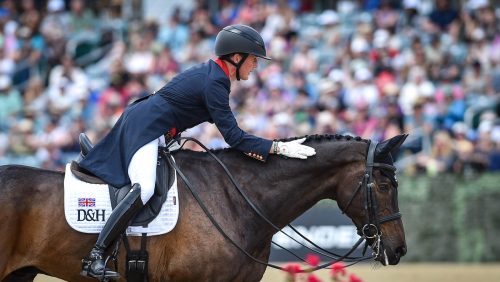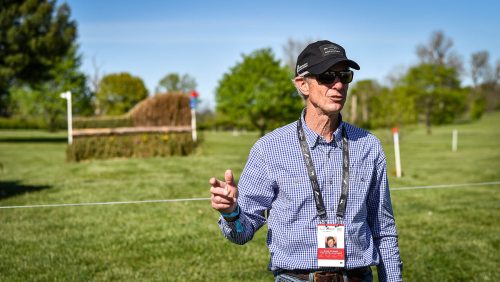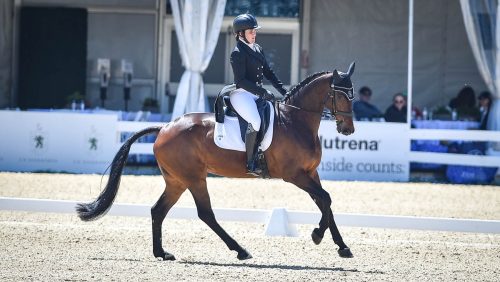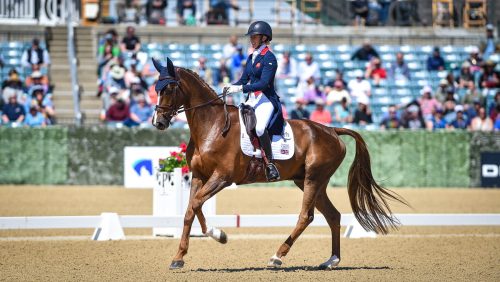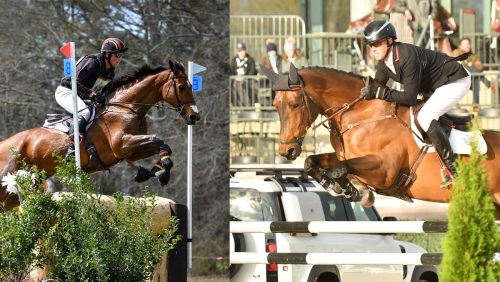I recently finished a feature for the Chronicle’s print edition about Kerry Thomas, who’s a type of sports psychologist for horses. Thomas doesn’t train horses, but instead helps people understand more about how their horse processes their environment; are they better visual or auditory learners, for example?
Like any other behavior expert, I know of many people who swear by Thomas, and am aware there are people who doubt his methods. The truth is that much of his business starts because people want to understand what their horses are thinking.
Riders and trainers spend a lot of time and money trying to figure out what’s going on in between those ears. Part of it is so we can get the best performance out of them, and part of it is that we seem to feel we owe them some greater understanding.
It’s difficult, this business of figuring up what I owe my horse. She would say I’m too light on the cookies and too heavy on the walk-to-canter transitions.
In the absence of language, I panic over the depth of shavings in her stall, hoping it’s adequate to encourage her to lie down and rest. I solicit dozens of opinions on which product is best to pack her barely-bruised hoof. I lift weights before bed to make my arms stronger and hands steadier during our dressage rides.
I have no idea if any of it makes a bit of difference to her.
ADVERTISEMENT
I have known of what feels like far too many owners sell beloved horses not because they can’t afford them, but because they feel the horse has more potential in their sport than they do. It wasn’t fair, one rider told me, for her mare to spend her time running training level when she could easily be an upper-level horse in more experienced hands.
In all these situations, there were probably other issues—other life events, emotional tempests, maybe some unmentioned financial pressure—that contributed to putting the horse up for sale, but the reason I saw people agonize over was their own inadequacy. They felt their horses were as distressed by the situation as they’d made themselves, and they felt the horses were owed more.
I believe horses are sentient beings capable of a greater command of English than we give them credit for, more critical thinking than a lot of people I’ve met, and a solid ability to ponder the future. I don’t believe that they spend a lot of time sitting around thinking, “If only I belonged to William Fox-Pitt, I’d finally get to a CCI***.” If I thought horses had the career focus of stockbrokers, I’d have to confine myself to riding 20-year-olds in semi-retirement, because I don’t have much interest in anything more than novice.
Having known Jitterbug for seven of her 12 years, I’m very confident in my belief that she spends more time worrying about her next meal or the flies or the temperature than whether she’ll ever get to do the three-foot jumpers. Evolutionarily, horses are built to be animals who think about food basically all of the time, and I’ve seen no evidence in 20 years of riding them that domestication has changed this.
I don’t think we owe it to our horses to be constantly determined to run them up through the levels of whatever sport we participate in. I’ll even go one step farther and say that I don’t think we owe it to them to be perfect riders… because most of us, as adult amateurs, won’t be.
We have our ceilings on what we can reasonably expect to achieve in the show ring as we juggle jobs and schedules. If our “ability ceiling” is lower than our horse’s, isn’t that a good thing from the horse’s perspective? Less pressure, less sore muscles?
ADVERTISEMENT
I do think we owe them the basics: good food, clean water, adequate shelter, a good veterinary/farrier routine.
And I think we owe it to our horses to try to become better riders, or at least kinder ones. Jitterbug often reminds me that she’s the one lugging my ample bottom around the ring, and the least I can do is to stay out of her way as she carries us over the jumps.
Some days, that’s probably a more welcome task than others. After all, horses have good days and bad ones. Stuff that we never see or hear about can stress them out or bug them. Maybe a fly bite is itching or the neighbor has been mowing all day and no one got their midday naps. There are afternoons I bring Jitterbug out of the stall and realize that something has gotten her up on the wrong side of the shavings pile.
As much as I’d like to work her out of it, I know what it’s like to feel like you just don’t want to go to work today. I can’t buy her a latte or a shot of bourbon to make it better, but I can agree to (try to) understand where she’s coming from. I think I owe her that much.
You’ve gotten to know Jitterbug, the Chronicle’s Quadraped Correspondent, over her years of posting hilarious columns from a cantankerous draft-cross mare’s point of view. And now her “Human,” Natalie Voss, has joined our roster of bloggers to share her adventures as a hunter-rider-turned-eventer mounted on the ever-opinionated Jitterbug.







